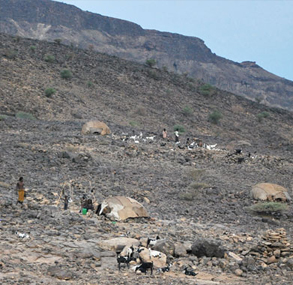Field Stories
Women at the heart of pregnancy care in Ethiopia
January 30, 2025
WP_Term Object
(
[term_id] => 49
[name] => Field Stories
[slug] => all-field-stories
[term_group] => 0
[term_taxonomy_id] => 49
[taxonomy] => news-category
[description] => Discover the personal stories of people whose lives have been impacted by better nutrition, and those working tirelessly to deliver it.
[parent] => 0
[count] => 181
[filter] => raw
)
Maternal and Newborn Health and Nutrition Project: Nurturing Pregnant Women and their Babies in Afar
When Halima was pregnant, she was lucky to have had the support of a Health Extension Worker – in this rare case, a male worker who she saw twice during her pregnancy.
Posted on November 18, 2012
 It rained on July 25 in Anderkelo Shet’. In a region of Ethiopia that receives mere inches of rain a year, this was significant. It nurtured the arid soil. It also provided welcome relief from the otherwise persistent glare of the sun and the searing July temperatures that regularly breach the 40 degree mark.
It rained on July 25 in Anderkelo Shet’. In a region of Ethiopia that receives mere inches of rain a year, this was significant. It nurtured the arid soil. It also provided welcome relief from the otherwise persistent glare of the sun and the searing July temperatures that regularly breach the 40 degree mark.
The next day, enjoying the cooler temperatures brought by the rain, Halima Haki Ahmed, along with her four-month old son, her husband, and their support network, met with a small delegation of nutrition and health experts to share their experience of antenatal health care.
For the pastoralists of Afar in the north-east of Ethiopia, life is tough. For the women of Afar, nurturing and giving life is tougher still. Too many of them lose their lives in childbirth, or have to watch their newborn children die.
Two-thirds of pregnant women do not receive any health or nutrition counselling from a trained antenatal care provider, or have their health assessed at any time during their pregnancy. Almost no pregnant women take iron supplements, despite the high rates of anaemia in the country and the risks it presents. Only 7 per cent give birth with a skilled attendant.
When Halima was pregnant, she was lucky to have had the support of a Health Extension Worker – in this rare case, a male worker who she saw twice during her pregnancy. Thanks to his counselling and the supplies at his disposal, Halima took iron and folic acid supplements the entire time she was provided with them. She gave birth to her son at an equipped health post. He was born with no complications, and she has been exclusively breastfeeding him since he first latched onto her breast. Recently, she took him for his first vaccination.
Halima is now part of Ethiopia’s Health Promotion Army, sharing her experiences in her community and helping inform other families about the importance of seeking antenatal care.
Her story, while not common, was heartening for the visitors who were on their way to Addis Ababa to help launch the Maternal and Newborn Health and Nutrition Project to improve and expand services in the region of Afar.
A partnership of the Federal Ministry of Health of Ethiopia, the Micronutrient Initiative and Emory University, funded by the Canadian International Development Agency, the project is supporting the government’s Health Extension Program – a strategic outreach initiative to reach those who are not currently accessing health services.
By improving materials, protocols and training of care providers, and involving families in the process of expanding community-level care, the project aims to improve nutritional status, birth preparedness, referral for emergency obstetric and newborn care, and birth practices such as delayed cord clamping and early initiation of breastfeeding.
Just as the rain nurtured the soil in Anderkelo Shet’, the Maternal and Newborn Health and Nutrition Project will help nurture pregnant women and their babies throughout Afar.
This will bring welcome relief in a place where the risks of pregnancy and birth seem as high as the temperatures in this arid land.